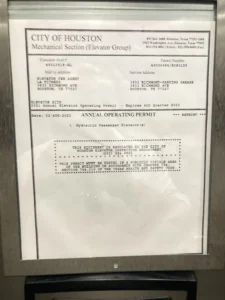A recent Reddit thread titled “Houston Elevator Permits Are Meaningless” sparked a conversation that, while hyperlocal, touches on a broader truth that applies to commercial property owners, REITs, and healthcare operators everywhere: life safety compliance isn’t just about avoiding fines, it’s about maintaining trust, reputation, and safety.
The post included a now-expired 2022 elevator operating permit still on display in a Houston parking garage. The discussion that followed revealed just how common expired certifications are, and how little enforcement actually happens in some jurisdictions. But perhaps the most revealing aspect wasn’t the permit itself, it was the public reaction.
 A Permitting System With No Teeth
A Permitting System With No Teeth
In Houston, elevator permits are issued by the city’s Mechanical Section (Elevator Group). According to the thread, if a building owner fails to renew a permit or even fails inspection, there’s effectively no consequence, because the elevator group doesn’t issue fines, and the fire marshal doesn’t respond to enforcement requests from that department.
The result? Many property owners have realized that they can simply skip permit renewals without risk of penalty.
“There is no incentive to renew it because there will not be any fines.”
– Reddit user /29187765432569864
The Real Cost of Non-Compliance
While the lack of enforcement may seem like a loophole, it creates long-term risks that far outweigh the short-term savings. And that’s where Confirmed Life Safety steps in.
Compliance is not just a regulatory checkbox, it’s a reflection of your commitment to safety for tenants, visitors, and staff. When certifications are expired or ignored, the message is clear: this building doesn’t prioritize safety.
In the thread, several users shared their frustration and discomfort riding elevators with visibly outdated permits:
“I was so pissed after being stuck in one during undergrad that I walked to every building on campus snapping photos of their four-year-old expired certs.”
– Reddit user /ROJJ86
“Citizens can report things to the fire marshal, but they just ignore those complaints. So if a property owner has a worn-out elevator, no big deal.”
– Reddit user /29187765432569864
This isn’t just anecdotal frustration. In multi-tenant properties, commercial facilities, or healthcare centers, perception of safety directly impacts tenant satisfaction, leasing retention, brand trust, and, in some industries like healthcare, regulatory risk and liability.
When Compliance Isn’t Enforced, Risk Grows Quietly
Lack of enforcement does not equal lack of responsibility. When elevator systems are overdue for inspection, you’re not just risking a citation, you’re gambling with:
Catastrophic equipment failure
Tenant injury and liability exposure
Increased insurance scrutiny or denial
Negative online reputation
Tenant turnover and vacancy
Even users in the Reddit thread noted federal buildings exempt from local permits often have non-working elevators, a powerful example of how non-compliance can lead to chronic failure over time, especially when incentives for enforcement are weak.
What Property Managers and REITs Can Learn
If you’re managing a large commercial or healthcare portfolio, especially in states with fragmented enforcement like Texas, the responsibility to maintain life safety standards falls on your shoulders, not the city’s.
Confirmed Life Safety helps solve this with a platform that ensures you’re never caught off guard:
Automated tracking of inspection intervals and certifications
Standardized documentation from your vendors
Compliance reports you can present to insurers, boards, or auditors
Life Safety Risk Indexing to prioritize the most urgent risks portfolio-wide
The Bottom Line: People Notice
This Reddit post proved that even the general public notices expired life safety documents. So do your tenants, your visitors, your insurers, and your investors. While some jurisdictions may lag in enforcement, your responsibility doesn’t disappear, and the reputational risk continues to grow.
Compliance isn’t about avoiding fines. It’s about protecting people, and showing that you take their safety seriously.
Want to get ahead of your elevator certification schedule?
Let us help you audit your current status, document your inspections, and set a schedule that’s both compliant and future-proof.
 A Permitting System With No Teeth
A Permitting System With No Teeth